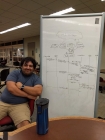When he is not putting in time as Chief Technical Officer of a startup or working through junior year of a computer science degree, you can find Eric Solender volunteering his weekends at Children’s National Medical Center in D.C. In 2013, he was on the other side of the clipboard. “I almost died from a concussion when I was in middle school, and I got treated there for it … it makes me feel good to take the experience I had and make it better for other kids,” Solender shares.
After that year-long medical crisis forced him to drop out of sports, his focus shifted to programming. The trauma seeded the idea for his first of several community-focused tech inventions and in high school, he configured a hands-free concussion test using the Microsoft Kinect gaming system. This caught the attention of not only national news media outlets such as NBC and USA Today, but also of UMBC President Freeman Hrabowski.
“Dr. Hrabowski has been mentoring me since I was a freshman … whenever I leave [his] office, I feel inspired,” Solender says. Solender now meets with the UMBC President on a semi-regular basis, updating him on things like his school success, his pet projects and more recently his startup company, MindStand Technologies.
An established humanitarian himself, Dr. Hrabowski likewise has nothing but positive regard for this up-and-comer. “Eric has focused on one of the critical challenges in our society right now — bullying — and has taken the possibilities of solutions to the next level,” says Hrabowski. “I am very impressed.”
Solender’s business integrates technical abilities with public-spiritedness, using machine learning algorithms to detect online harassment speech. Written in a mix of Python, GoLang and C, the model will be continuously trained on pre-tagged examples to recognize the patterns of how concerning text is written.
He intends to introduce MindStand to larger corporations to start. While possibly helping those organizations get in front of lawsuits, this will also give the model access to bigger data that can fine-tune it for the consumer market, with the eventual goal of providing it as a product for worried parents. The myUMBC website will be its first test.
As UMBC Chief Information Officer Jack Seuss explains, “Occasionally we will have posts on myUMBC where somebody might be trolling, just general bad online behaviors.” They are hoping to utilize MindStand to find these instances and deal with them in real time. “We’re still in the early stages, but we have a development environment in the myUMBC website. I really love the idea of helping students test out their ideas through the university.”
“It’s a really compelling idea,” praises UMBC’s Vice President for Institutional Advancement Greg Simmons, “I’ve known Eric since his first year here, he’s always had an entrepreneurial bent.”
Although not given a title until later, MindStand was initially conceived for BitCamp, a weekend hackathon hosted at the University of Maryland, College Park. “The morning before, I had no idea what I was going to do. I work in a Psych lab, and one of the girls [Pamela Rakhshan] — actually she’s a part of the company now, too — suggested I do something related to mental health,” Solender recounts.
Having had his own difficulties with mental health in the past, this struck a chord with him and lead to the creation of a rudimentary version of the technology that now serves as the basis for the business.
Out of more than 750 attendees, his team of five took second place. “The Microsoft guys there basically said, ‘You’d be stupid if you didn’t do anything with this.’ So here we are.”
Technical details aside, it is just another way Solender is trying to help people. “We stand for the minds of kids, so it’s ‘MindStand’,” Solender continues. “Parents have no idea what’s going on. There’s just so much content out there, it’s impossible for any person to digest it all and determine what is okay and what could be dangerous.”
Like many people, he felt helpless hearing about mass shootings and disturbed by the knowledge that in many cases, indications of a threat were present on social media long before an act of aggression took place. “In a lot of cases, by the time they found it, it was too late,” Solender imparts. He hopes that this product will prevent troubling content from simply getting lost in the shuffle.
Given the subject matter, MindStand Tech is working closely with the on-campus psychology lab team to categorize the training data set and determine how to best respond to anything uncovered. Dr. Schiffman has known Solender since his freshman year at UMBC and for the past year and a half, Solender has handled many of the technical aspects of Schiffman’s studies in the lab.
“Computer science is the way of the future, and it has the potential to affect people’s mental health in really positive ways,” Schiffman attests, and he too has an appreciation for Solender’s skills in the field. Solender insists that without the input of mental health professionals, “we’re just engineers making assumptions.”
Solender wants to stress that while they hope (and expect) that the business will become profitable, money is not the mission. In fact, he estimates that between him and the CEO, junior mechanical engineering major Michael Ogunsanya, they have already shelled out close to $7,000 of their own funds so far to kick things off. “None of us are doing this solely for money. If money comes, great, but this was never about money — it’s about doing something positive,” Solender says.
“I’m troubled by all of the hateful rhetoric that’s in the news and everywhere right now, and I wanted to do something. I feel like I can use my abilities in software engineering to combat that sort of thing,” Solender says. “If we can save one kid’s life, it’ll all be worth it.”


